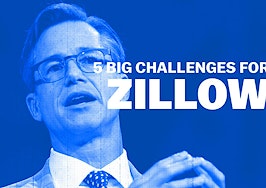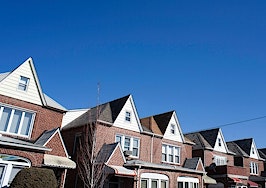One in five homes resold by iBuyers Zillow, Opendoor and Offerpad in 2021 ended up being flipped to institutional investors and other private entities, “a secret pipeline” with the potential to exacerbate inventory shortages in markets where iBuyers are active, according to a Bloomberg analysis.
Bloomberg’s analysis of 100,000 property records compiled by Attom Data Solutions found that iBuyers were 60 percent more likely to flip homes to investors in predominantly non-white areas, with thousands of homes sold to landlords backed by KKR & Co., Cerberus Capital Management, Blackstone Inc., and other private ventures.
In one “hot spot within a hot spot” — McDonough, Georgia — Bloomberg found that 70 percent of homes flipped by iBuyers were resold to investors, many without being listed. Located 30 miles southeast of Atlanta, McDonough is two-thirds African American.
“These companies go around saying, ‘We’re going to help mom and pop and inject liquidity into the market,’” Inman contributor Mike DelPrete told Bloomberg. “They don’t say, ‘We’re going to suck up houses from the ordinary market and sell them to Wall Street.’ ”
Although Zillow announced in November that it was closing down its iBuying service, Zillow Offers, it’s still in the process of selling off homes it acquired.
Zillow spokesman Viet Shelton told Bloomberg it’s common for iBuyers to sell homes through “varied sales channels” including families, small investors and institutional landlords and nonprofits.
An Offerpad spokesperson told Bloomberg its sells most of the homes that it buys to individuals, but the company has “a diverse mix of customers that benefit from the ease and simplicity of our services,” and that “where investors choose to do business is a function of their strategy.”
Offerpad, which went public last fall with a $2.7 billion valuation, is seeking to take on more than $600 million in additional debt to buy more homes as it expands into new markets.
Opendoor — the leader in the category, with 15,181 homes bought and 5,988 sold during the third quarter — is also taking on hundreds of millions in debt to fuel growth.
Investors bought 18 percent of U.S. home sold during the third quarter — the highest share in records going back 20 years, Bloomberg reported, citing research by Redfin Corp., which has also dipped its toe into iBuying.
But iBuyers say that they’re still relatively small players in terms of overall market share, and shouldn’t be blamed for the remarkable runup in home prices during the pandemic. An analysis by Zillow concluded that during the second quarter, iBuyers collectively accounted for 1 percent of the U.S. home sales market.
Bloomberg pulled deed records from a national database of iBuyer transactions compiled by Attom Data Solutions and matched records where the seller’s name corresponded with an entity used by Offerpad, Opendoor or Zillow. Buyers whose names didn’t appear to be a person or a family or living trust were categorized as an investor or “other entity.”






